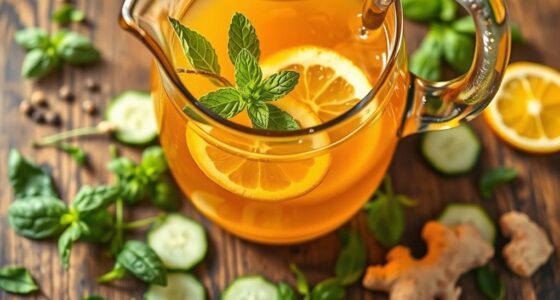Valerian root, chamomile, and turmeric are just a few herbs that have been used for centuries to alleviate muscle tension and spasms, offering a safer, more natural alternative to conventional treatments. These herbs have anti-inflammatory and muscle-relaxing properties, providing effective relief from muscle cramps, spasms, and inflammation. Compared to conventional medications, herbal remedies generally have fewer side effects and can be used in combination therapy for customized relief. To achieve best results, it is crucial to approach herbal remedies with caution, consult with healthcare professionals, and incorporate them into daily routines for long-term muscle health benefits – and there's more to explore on this path to natural relaxation.
Key Takeaways
• Valerian root, chamomile, peppermint, turmeric, and passionflower are effective herbs for relieving muscle tension and spasms naturally.
• Herbal remedies offer a natural alternative to conventional treatments with fewer side effects, such as drowsiness, dizziness, and nausea.
• Valerian root acts as a natural muscle relaxant, while chamomile's flavonoids have anti-inflammatory properties, and turmeric's curcumin reduces inflammation.
• Consistency is key when using herbal remedies, as they may not provide instant relief, and individual body chemistry impacts their effectiveness.
• Consulting healthcare professionals ensures the safety and effectiveness of herbal remedies for long-term muscle health and relaxation.
Herbal Remedies for Muscle Relief
Five effective herbs – valerian root, chamomile, peppermint, turmeric, and passionflower – have been found to provide natural muscle tension relief. These herbs have been used for centuries to alleviate muscle spasms, cramps, and inflammation.
Chamomile, for instance, contains flavonoids with anti-inflammatory properties, while peppermint offers cooling relief. Valerian root acts as a natural muscle relaxant, and turmeric's curcumin helps reduce inflammation. Passionflower, on the other hand, boosts GABA levels to reduce muscle tension linked to stress and anxiety.
Comparing Natural to Conventional

While herbal remedies offer a natural approach to muscle tension relief, they also provide a compelling alternative to conventional treatments, which often come with a list of potential side effects. In contrast, herbal remedies generally have fewer side effects compared to conventional medications. This is evident in the comparison below:
| Treatment | Side Effects | Natural Benefits |
|---|---|---|
| Conventional Medications | Drowsiness, dizziness, nausea | Quick relief, widely available |
| Herbal Remedies | Mild stomach upset, allergic reactions | Holistic benefits, fewer side effects |
| Combination Therapy | Varies depending on combination | Customized relief, synergistic benefits |
Herbal remedies like chamomile and arnica provide a natural alternative to conventional muscle relaxants.
Consultation with healthcare providers is essential before starting any herbal regimen.
Herbal Benefits for Muscle Health

Valerian root, chamomile, and turmeric stand out as herbal powerhouses, each offering unique benefits that target specific aspects of muscle health, from easing spasms to reducing inflammation.
Valerian root, in particular, eases muscle spasms and interacts with GABA receptors for calming effects.
Chamomile's 36 flavonoids have anti-inflammatory properties for muscle relaxation.
Turmeric's curcumin targets inflammation and muscle soreness effectively.
These herbs provide a natural alternative to conventional muscle relaxants, offering a holistic approach to muscle health.
Safety and Effectiveness Considered

As individuals explore the benefits of herbal remedies for muscle health, it's equally important to explore the safety and effectiveness of these natural alternatives.
While herbal treatments can be effective, they may not provide instant relief and require consistent use for significant effects. Some herbs, like kava kava, can have side effects, emphasizing the significance of consulting healthcare professionals.
Individual body chemistry impacts herb effectiveness, and safety precautions are necessary even with natural remedies. Over-the-counter herbal preparations can be potent, and misjudging herb potency can lead to health issues.
It's essential to approach herbal remedies with caution and consult with healthcare professionals to ensure safe and effective use.
Strategies for Long-Term Health

By incorporating herbal remedies like valerian root, chamomile, and lavender into daily routines, individuals can benefit from long-term muscle health and overall well-being. A holistic approach, tailored to individual needs, is recommended to achieve best results. Consulting healthcare professionals guarantees the effectiveness and safety of natural remedies for maintaining muscle health.
| Herbal Remedy | Benefits | Precautions |
|---|---|---|
| Valerian Root | Relaxes muscles, calms nervous system | Interacts with certain medications |
| Chamomile | Reduces inflammation, soothes muscle spasms | May cause allergic reactions |
| Lavender | Promotes relaxation, improves sleep | Can interact with certain medications |
Frequently Asked Questions
Can Herbal Remedies Interact With Prescription Medications?
She notes that herbal remedies can interact with prescription medications, emphasizing the importance of consulting healthcare professionals before combining natural remedies with conventional treatments.
For instance, valerian root can enhance the sedative effects of certain medications, while turmeric's curcumin may increase the risk of bleeding when taken with blood thinners.
It's imperative to disclose all supplements and medications to guarantee safe and effective treatment.
Are Herbal Supplements Suitable for Pregnant or Breastfeeding Women?
As the ancient Greek physician Hippocrates wisely noted, 'Everything in excess is opposed to nature,' highlighting the importance of caution when considering herbal supplements during pregnancy or breastfeeding.
In this case, it's essential for pregnant or breastfeeding women to exercise extreme caution when using herbal remedies, as some can stimulate the uterus, induce labor, or even harm the fetus.
How Long Does It Take to Notice Results From Herbal Remedies?
It typically takes consistent use of herbal remedies over a period of weeks or months to notice significant results. According to experts, 'herbal treatments may not provide instant relief and require consistent use for significant effects.'
Patience is key, as individual body chemistry and herb potency impact effectiveness. With regular use, users can expect to experience relief from muscle tension and inflammation, promoting overall well-being.
Can Herbal Remedies Be Used in Conjunction With Physical Therapy?
Herbal remedies can indeed be used in conjunction with physical therapy to enhance muscle relaxation and relief. By combining natural remedies like valerian root, chamomile, and turmeric with physical therapy exercises, individuals can experience improved muscle flexibility, reduced inflammation, and enhanced overall well-being.
This integrated approach allows for a more inclusive treatment plan, addressing both physical and emotional aspects of muscle tension.
Are Herbal Remedies Regulated by Government Agencies?
Government agencies, such as the US Food and Drug Administration (FDA), regulate herbal remedies to some extent. While they're not as strictly regulated as prescription medications, herbal supplements must comply with good manufacturing practices (GMPs) and labeling requirements.
However, the FDA doesn't test herbal products for safety and efficacy before they hit the market, so it's essential for consumers to research and choose reputable manufacturers.
Conclusion
To sum up, embracing herbal remedies for muscle relief is like exploring a serene ocean, where the waters of natural wellness intersect with the shores of modern science.
By harnessing the power of botanicals, individuals can chart a course towards long-term health, free from the undertows of conventional medications.
As Dr. Andrew Weil, a pioneer in integrative medicine, notes, 'Herbal remedies can be a valuable addition to a holistic approach to health, offering a safe and effective means of alleviating muscle tension.'










